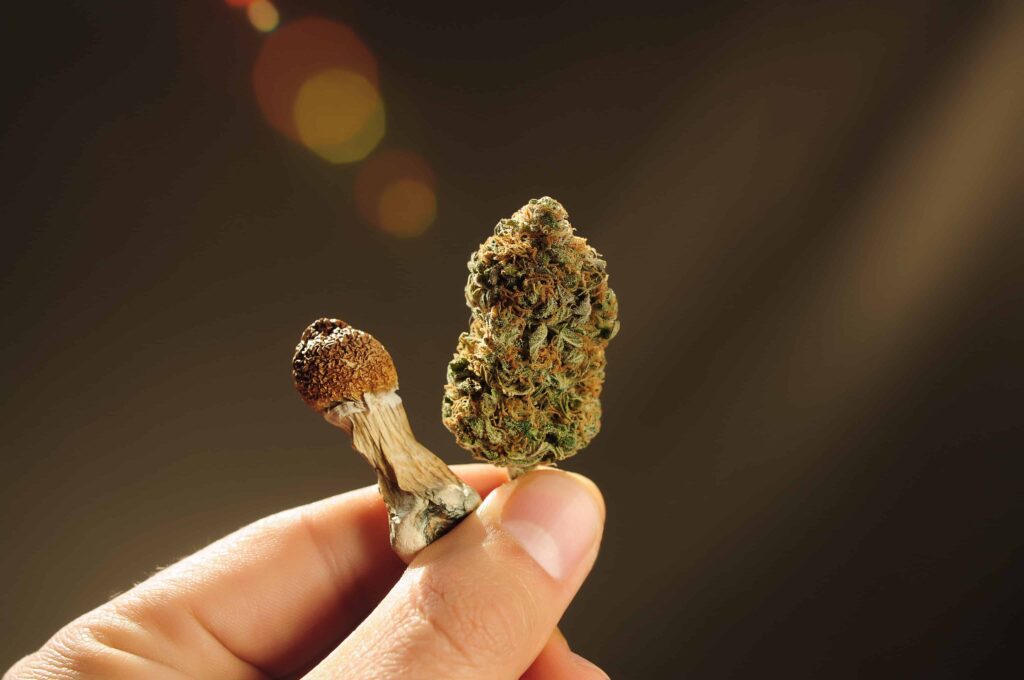
The House Rules Committee recently cleared two cannabis and psychedelic-related amendments on Sept. 23 to be discussed on the floor. Days later on Sept. 27, the House approved the two amendments—Amendment No. 48 and Amendment No. 137—to be included in H.R. 4365, or the Department of Defense Appropriations Act, 2024.
Amendment No. 48, supported by Texas Reps. Dan Crenshaw and Morgan Luttrell, would provide $15 million Department of Defense funding for psychedelic medical clinical trials. Through a voice vote, it passed with 240 in favor and 191 opposed.
The second amendment, Amendment No. 137, was sponsored by only Crenshaw and would ask the Defense Health Agency (DHA) to submit a congressional report on how to provide options for active-duty service members who suffer from Traumatic Brain Injury (TBI) and PTSD. It would also allow them to participate in clinical trials through the Department of Veteran Affairs to study psychedelics.
Luttrell spoke ahead of the vote on Amendment No. 48, explaining how he “personally attest[s] to the benefits in treating post-traumatic stress, traumatic brain injury and chronic traumatic encephalopathy through the use of psychedelic substances.”
Luttrell served as a SEAL for 14 years, and endured through a nearly fatal helicopter crash that left him with a broken back and a TBI. In June, Luttrell spoke openly about using ibogaine and 5-MeO-DMT as treatment for his injuries at a press event at the capitol with the introduction of a federal grant bill for psychedelic research. “If you find yourself in a place that you were lost, and no other modalities have worked, this could possibly be that tool,” Luttrell said. “And I can honestly stand in front of all of you and the American public and say I was reborn. This changed my life. It saved my marriage. It is one of the greatest things that ever happened to me.”
At the most recent hearing, Luttrell explained why the amendment should be passed. “There’s a stigma that exists within the [House] that I believe stems from a lack of education experience around the clinical use of plant-based, or psychedelic, medications,” Luttrell said. “I understand that when many of my colleagues hear the word ‘psychedelics,’ they think of mushrooms and so on. This isn’t what we are talking about today.”
“Unfortunately, the stigma has led to the slow or no adoption of medical procedures that may have saved countless lives, and our service members, veterans and first responders,” Luttrell continued. “It is our duty to explore all options when the lives of our nation’s most precious resources our sons, our daughters, our mothers, our fathers, brothers and sisters are at stake.”
Rep. Betty McCollum spoke to oppose Amendment No. 48, claiming that the DHA can’t realistically implement these measures because of current “clearances, legal hurdles, and logistics,” and “reluctantly” denied support.
Crenshaw later spoke to congress for Amendment No. 137 in defense of psychedelic clinical trials, describing it as an important step forward. “…there’s no reason that we should not be looking into the benefits of this research for our men and women that are already currently serving our country actively,” Crenshaw explained. “This is not about legalization. This is not about recreational use. It’s about honoring our promise to our military families and confronting the high incidence of suicide in the military and veteran community.”
“We should be listening to the stories. They have come up on Capitol Hill multiple times,” Crenshaw added. “For the members who say, ‘Well, we need to learn more. We don’t know enough’—well then why would you get in the way of more research?” he asked. “We shouldn’t make them come up here and spill their guts anymore. We should listen to them and we should act on it.”
The SAFER Banking Act was passed in the Senate Banking Committee on the same day that these amendments were approved in the House. Seven previous iterations of the bill (formerly called the “SAFE” Banking Act”) have progressed to varying levels of congress before, the most recent of which was in December 2022 was it was left out of the Defense Spending Bill.
Many legislators support passing the SAFER Banking Act to protect both financial institutions and cannabis businesses. A joint statement from senators Jeff Merkley, Steve Daines, Kyrsten Sinema, Cynthia Lummis, and Majority Leader Chuck Schumer collectively spoke in favor of the bill and its necessity. “This legislation will help make our communities and small businesses safer by giving legal cannabis businesses access to traditional financial institutions, including bank accounts and small business loans,” the joint statement said. “It also prevents federal bank regulators from ordering a bank or credit union to close an account based on reputational risk.”
On Sept. 28, Schumer spoke about the next steps for the SAFER Banking Act. “The next step is to bring SAFER Banking to the floor for a vote, which I will do soon,” he said. “I worked long and hard for years to get us to this point, and now the Senate is one step—one crucial step—closer to helping cannabis businesses operate more efficiently, more safely and more transparently in the states that allow cannabis to be sold.”
Read full article on High Times

